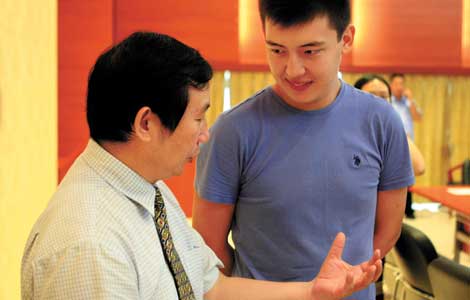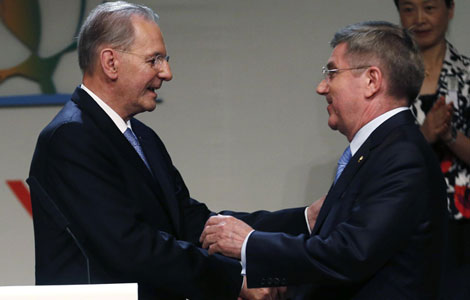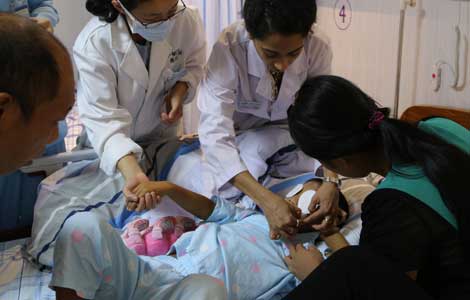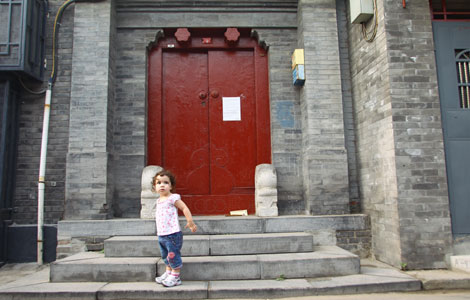Mosques spread word on reproductive health
Updated: 2013-09-12 01:29
By SHAN JUAN (China Daily)
|
||||||||
Imams join the efforts to deliver services among religious followers
For Muslims, a mosque is where they seek spiritual tranquility.
In Wuzhong, Ningxia Hui autonomous region, they serve another purpose — reproductive health education.
An hour's drive from Yinchuan, the capital of Ningxia, Muslims comprise more than half of Wuzhong's population of 1.5 million, and the city has more than 1,200 mosques, the most of any Chinese city.
To help improve reproductive health and family planning in Muslim communities, in 1999 the China Family Planning Association began to involve imams in Wuzhong in spreading such information and helping to deliver related services among followers.
The model, which has been effective in Ningxia, will soon be expanded to the provinces of Shaanxi, Gansu and Qinghai, as well as the Xinjiang Uygur autonomous region, Gou Qingming, deputy director of the association, told China Daily.
"Muslims respect and listen to imams, so working with the religious leaders helps substantially when we try to institute a reproductive health plan and improve reproductive health for them," Gou said.
Nearly 1 million Muslims have benefited from the project, said Ma Xiufen, director of the region's family planning association.
Of the 1,580 mosques in Ningxia, more than 500 have installed facilities such as a reproductive health service room and demographic cultural library, she said.
These efforts have paid off, according to a survey conducted locally.
Ninety-seven percent of local Muslims were aware of reproductive health in 2011, compared with only 46 percent in 1999, the survey showed.
The incidence of female reproductive tract infection was lowered to 43 percent in 2011, from 77 percent in 1999.
Wu Xuexing, an imam at Qinqiao Mosque, said the mosque has become a popular platform for reproductive health and family planning education.
"Followers now expect more from mosques, such as health knowledge and services," said Wu, who also serves as deputy director of Wuzhong Family Planning Association.
But when the project started in 2000, many people simply rejected the idea, he recalled. "I was denounced as a ‘family planning imam' back then," he said.
It has taken time for Wu to gradually understand the benefits of family planning. "Muslims, particularly the women, have benefited a lot from the project," he said.
Each month, women can receive free medical examinations, such as breast cancer screenings, provided by local family planning institutions in the reproductive health service rooms inside mosques.
Lectures on reproductive and sexual health are also given regularly.
Ma Qiaomei, who lives in a nearby village, said it is convenient to undergo the physical checkups in the mosque. She said she hopes more gynecological examinations will be included in the checkups.
Previously, such services provided by family planning authorities were not so well received, she said.
Some people, particularly the elderly, would throw away condoms and contraceptive drugs delivered to their doors, she said.
Wu said most local Muslim women seldom sought gynecological health services in the past, due to a lack of awareness, limited access to services, and financial constraints.
"The situation gradually changed after the mosques and imams began to join the efforts," he added.
After receiving reproductive health training, Wu puts what he has learned into his preaching, particularly during major religious events like Eid al-Adha, or the Feast of the Sacrifice.
Posters promoting reproductive health and family planning are also displayed in the mosque's courtyard.
Ma Qiaomei said, "Thanks to the efforts, we began to know how to prevent unwanted pregnancies and how to conceive and raise a healthy baby."
But this has not been an easy process.
Throughout Ningxia, hundreds of training sessions have been held over the years for imams for this purpose, Ma Xiufen said.
To better popularize reproductive health knowledge among the Muslim population, local religious leaders have been organized to research the Quran and note the sections relevant to reproductive health.
Using such methods to spread the reproductive health message has proved a success, making it easier for people to understand and accept the knowledge, imam Wu said.
Inspired by the Wuzhong experience, imams in Hutubi county, Xinjiang, have started to give reproductive health lectures to Uygur Muslims in mosques.
Imam Yang Jie of Hutubi said many of the reproductive health messages are in line with the sacred doctrines of Islam, which has made imams' promotional work easy.
For example, the Quran says blood relatives must not marry, he said.
By preaching such knowledge based on Islamic law among followers, general reproductive health awareness can be raised and many outdated and unhealthy habits can be corrected, he said.
Some Muslim women used to shy away from buying sanitary napkins, and seldom dried their underwear outside, Yang said.
"Our advocacy will help them cultivate a lifestyle of good hygiene and health," he said.
In Wuzhong, religious leaders have compiled the key health messages into 12 Chinese characters that mean: cleaning before going to bed, drying underwear in the sun, taking care of the body, particularly during the menstrual period, and cultivating good hygiene and health habits, Gou said.
"Such efforts have helped improve reproductive health and prevent sexually transmitted diseases," he said.
Moreover, female imams have played a vital role in the project.
In Wuzhong, nearly all mosques have a female imam to serve female Muslims, said Wang Xiuyan, who performs this role. "They like to share private problems with us," she said.
Wang said that in Islamic teachings, reproductive health refers to the capacity to live from birth to death with reproductive choices, dignity, and to prevent reproductive health diseases and risks.
Each day, Wang receives 50 to 60 female followers at her mosque.
"It would be hard to imagine in the past that women would feel so at ease in receiving condoms and contraceptive drugs in the mosque," she said.

 China's Christian churches reduce leaders' age ceiling
China's Christian churches reduce leaders' age ceiling
 Student's rare blood bonds Kazakhstan and China
Student's rare blood bonds Kazakhstan and China
 Apple's low-end phone price disappointing
Apple's low-end phone price disappointing
 US marks 9/11 anniversary
US marks 9/11 anniversary
 German Bach elected as IOC president
German Bach elected as IOC president
 Implant surgery for boy's eyes a success
Implant surgery for boy's eyes a success
 Hutong life facing change
Hutong life facing change
 New York Fashion Week in session
New York Fashion Week in session
Most Viewed
Editor's Picks

|

|

|

|

|

|
Today's Top News
Report questions US firms pursuing cloud computing in China
Reducing poverty gains momentum in Asia
China turns to US sorghum for animal feed
Russia proposal likely to avert US airstrikes
Li stresses transformation of economy
FM dismisses Philippine accusations
China's global firms face 'trust gap'
Shanghai gets tips on innovation
US Weekly

|

|






